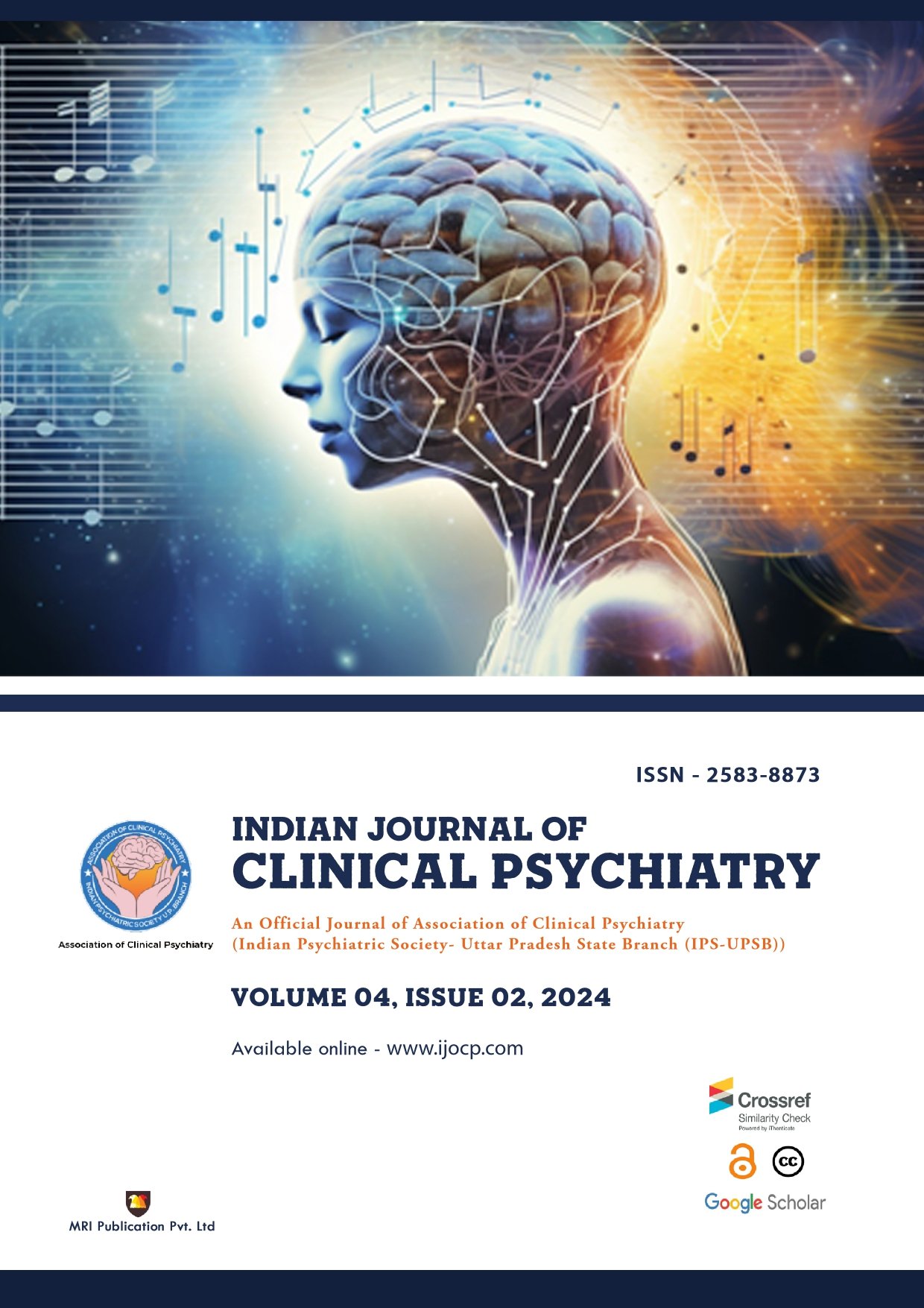Longitudinal Effects of Escitalopram on Quality of Life in Drug-Naive Generalized Anxiety Disorder Patients: A Six-Month Prospective Study
Downloads
Published
DOI:
https://doi.org/10.54169/ijocp.v4i02.144Keywords:
Generalized anxiety disorder, Hamilton anxiety rating scale, WHOQoL-BREF, DSM-5, Quality of life, Interventional study.Dimensions Badge
Issue
Section
License
Copyright (c) 2024 Chetan Choudhary, Rishabh Tripathi, Jishi Joshi Joseph, Kalpesh Gaur, Jitendra Jeenger

This work is licensed under a Creative Commons Attribution-NonCommercial-NoDerivatives 4.0 International License.
Purpose: The objective was to enlist individuals new to treatment for generalized anxiety disorder and assess their self-reported quality of life with the World Health Organization’s Quality of Life brief version Questionnaire (WHOQoL-BREF). The study also aimed to compare the quality of life (QoL) measures pre- and post-treatment.Abstract
Methods: A six-month interventional study monitored 60 participants who had never received treatment for generalized anxiety disorder (GAD) and were diagnosed according to the Diagnostic and Statistical Manual of Mental Disorders, Fifth Edition (DSM-5) criteria at a tertiary private hospital’s outpatient psychiatry department in Udaipur. Using the Hamilton anxiety rating scale, the severity of GAD was measured. Participants were included based on their existing prescription for escitalopram, administered as a 10 mg once-daily dose. Four weeks post-prescription, the WHOQoL-BREF questionnaire was employed to assess any shifts in quality of life.
Results: The study comprised 60 initial-treatment individuals with confirmed GAD diagnoses. The starting average WHOQoL-BREF score was 217.48. After four weeks of treatment with escitalopram, the average quality of life scores rose significantly to 276.48, indicating an average increase of 59 points and evidencing a marked improvement following treatment.
Conclusion: Escitalopram treatment was associated with significant QoL improvement in GAD patients. These outcomes underscore the necessity for effective treatment approaches for this disorder.
How to Cite
Downloads
Similar Articles
- Varshini Ragupathy, R. Neelakandan, Effectiveness of Art Therapy in Improving Quality of Life Among Cardiac Patients , Indian Journal of Clinical Psychiatry: Vol. 4 No. 02 (2024): Indian Journal of Clinical Psychiatry
- Kritika Chawla, Bandna Gupta, Comparative Study of Stress Response to COVID-19 and Coping in Patients of Depression and Anxiety Disorder , Indian Journal of Clinical Psychiatry: Vol. 4 No. 01 (2024): Indian Journal of Clinical Psychiatry
- Pallavi Sharma, Manmeet Singh, Sunny Babber, Chander Mohan, Rohit Jasrotia, Study of Anxiety and Depression in Post Graduate Residents during Active Phase of COVID-19 Duty in a Tertiary Care Hospital: A Pilot Study , Indian Journal of Clinical Psychiatry: Vol. 2 No. 01 (2022): Indian Journal of Clinical Psychiatry
- Aditi Jain, Abbas Mehdi, Evaluation of Language Dysfunction among Untreated Patients with Psychosis Attending the Psychiatry Inpatient Services of a Tertiary Healthcare Centre from North India: A Cross-sectional Study , Indian Journal of Clinical Psychiatry: Vol. 4 No. 01 (2024): Indian Journal of Clinical Psychiatry
- Madhavi Kodali, Therissa Benerji, Rashmitha Vetapalem, Varun Kumar Bandi, Krishna Mohan Parvathaneni, Perceived Stress and Quality of Sleep in Patients on Hemodialysis , Indian Journal of Clinical Psychiatry: Vol. 4 No. 02 (2024): Indian Journal of Clinical Psychiatry
- Shradha Khatri, Sunil Goyal, Childhood Sexual Abuse among Adults with First-Episode Depression and Generalized Anxiety Disorder: Comparison with Healthy Controls , Indian Journal of Clinical Psychiatry: Vol. 5 No. 02 (2025): Indian Journal of Clinical Psychiatry
- Dharmesh Choksi, Vishal Chhabra, K S Pavitra, Ramani P N, Sharmistha Chakroborty, Yakshdeep Dave, Zahraan Qureshi, Girish Kulkarni, A Cross-sectional, Multicenter, Observational Study to Assess the Safety and Usage Pattern of Antidepressants in the Management of Indian Patients with Major Depressive Disorder , Indian Journal of Clinical Psychiatry: Vol. 5 No. 02 (2025): Indian Journal of Clinical Psychiatry
- Kenil Jagani, Nidhi Doshi, Parag Shah, Psychosocial Factors Related to Attempted Suicide During COVID-19 Pandemic , Indian Journal of Clinical Psychiatry: Vol. 4 No. 01 (2024): Indian Journal of Clinical Psychiatry
- Riya Jain, Sayanti Paul, Arghya Pal, Prevalence of Premenstrual Syndrome in Undergraduate MBBS Students and their Work-related Quality of Life , Indian Journal of Clinical Psychiatry: Vol. 3 No. 01 (2023): Indian Journal of Clinical Psychiatry
- Menon, Natarajan Varadharajan, Immune-inflammatory Pathways in Somatoform-Disorders : A Theoretical Update , Indian Journal of Clinical Psychiatry: Vol. 1 No. 1 (2021): Indian Journal of Clinical Psychiatry
You may also start an advanced similarity search for this article.



